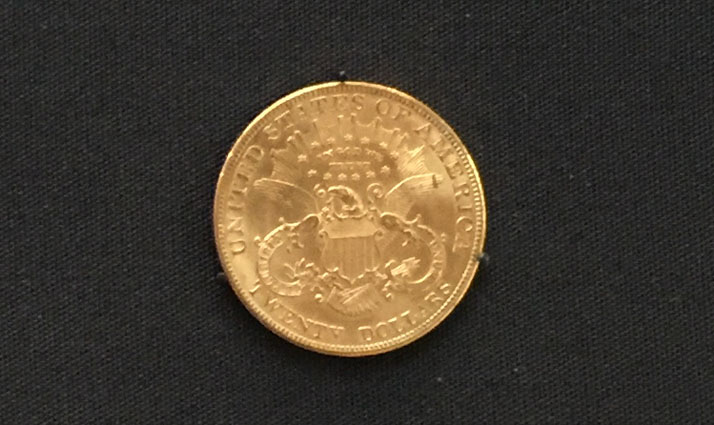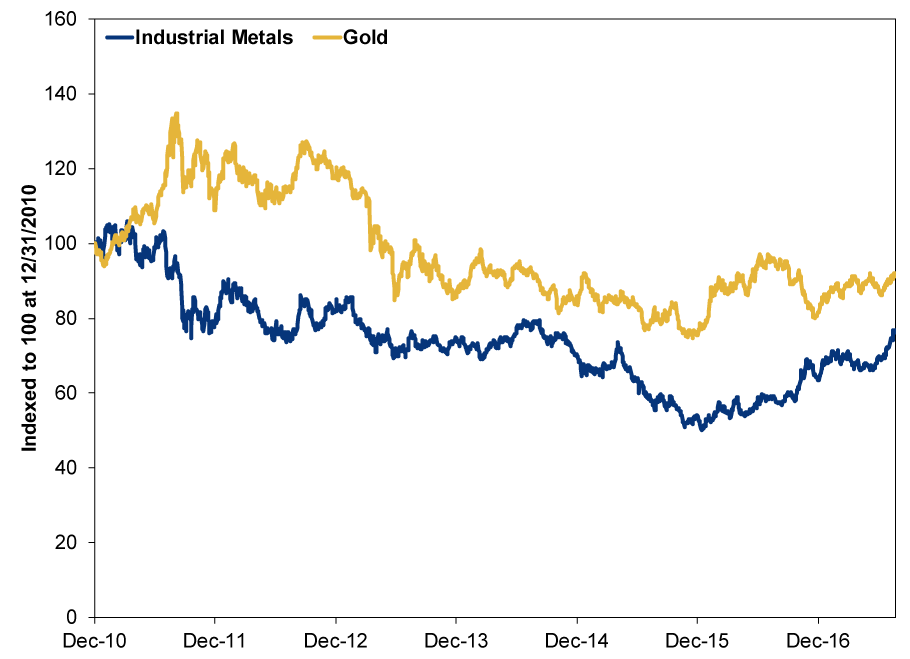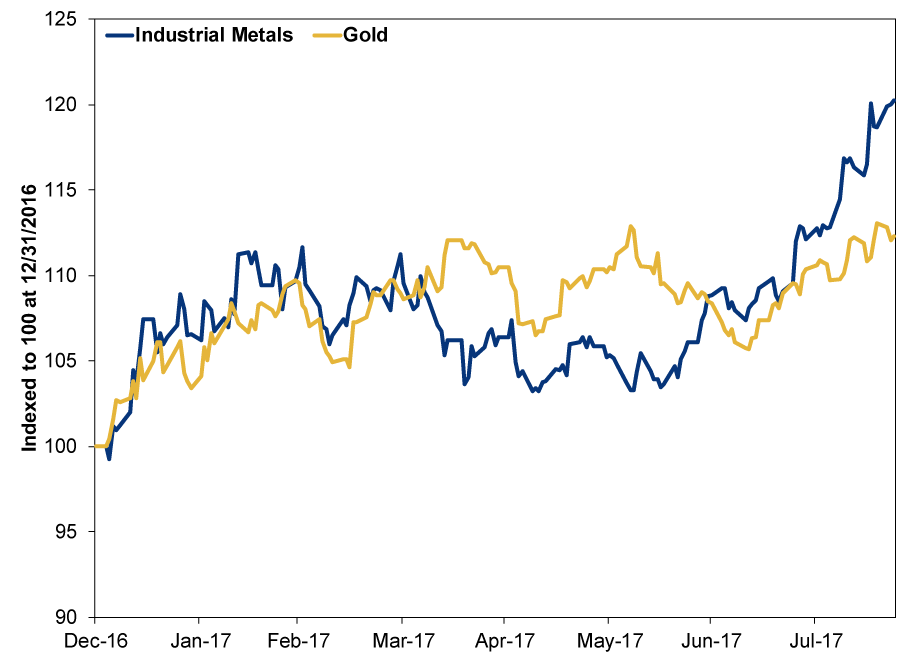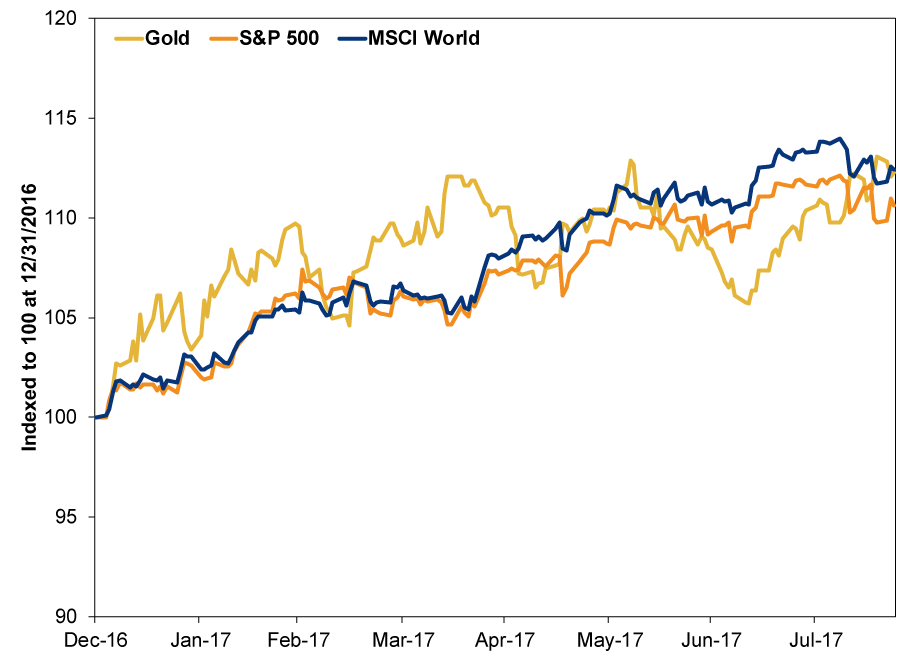Personal Wealth Management / Market Analysis
Gold Zoom, Copper Boom!
Metals are metals, and stocks are stocks.
This $20 gold coin is quite possibly the only physical gold worth owning. Then again, it's a lot heavier than a $20 bill, so why bother? Photo by Elisabeth Dellinger.
In the back-to-school spirit, here is a multiple choice question:
If gold is beating US stocks but industrial metals are beating gold, which of the following is true:
- Investors are uncertain
- Investors anticipate faster global growth
- Searching for meaning in all this is fruitless
This question is Open-Internet, but I reckon it won't be much use, because headlines are all over the map. Naturally, there is the uncertainty = gold rush crowd. But the copper and nickel and zinc, oh growth! crowd is excited, too. Seems to me it can't be true that investors are both uncertain about growth and excited for it to pick up. Markets are too efficient for that, and the cognitive dissonance would cause the worst headache of all time. So what's the deal?
In a nutshell: Gold is a commodity with no magical powers as a hedge against inflation, slow growth, calamity, alien invasions or a robot apocalypse. Over time, it'll probably trade more or less like its fellow commodities, particularly its metallic cousins. They all move on supply and demand, so trying to read their wiggles for clues on stocks' wobbles won't get you far.
As Exhibit 1 shows, gold and industrial metals endured four-plus year bear markets from 2011 through most of 2015-while stocks rallied and the global economy grew just fine. Were investors simultaneously certain (falling gold) and uncertain (falling industrial metals) about global growth? Nope. Rather, all were part of the broader Materials supply glut and long crash-an aftereffect of years of investment in new mines. Growth-particularly in Emerging Markets, where construction and infrastructure buildouts were all the rage-still boosted demand for copper, aluminum[i] and all the rest, but supply growth overshadowed demand. So prices fell.
Exhibit 1: A Metal Supply Glut
Source: FactSet, as of 8/24/2017. Gold spot price and S&P GCSI Industrial Metals Index, 12/31/2010 - 8/23/2017. The S&P GCSI Industrial Metals Index includes aluminum, copper, lead, nickel and zinc.
These days, metals producers are apparently cutting back somewhat. The World Bureau of Metals Statistics reported a global zinc deficit year to date (through May). China announced plans to cap aluminum production. Labor incidents at several mines have hampered copper output. And thanks to some regulatory issues in Africa and Indonesia, gold production is down year to date. So it should be no surprise that most metals-industrial and precious-have turned around somewhat this year.
Exhibit 2: A Metal Supply Pinch?
Source: FactSet, as of 8/24/2017. Gold spot price and S&P GCSI Industrial Metals Index, 12/31/2016 - 8/23/2017.
As for gold and stocks, the hullabaloo overlooks a key factor: While gold is beating the S&P 500 year to date, it is a whisker behind global stocks. Good luck trying to decipher that message.
Exhibit 3: Is This Uncertainty?
Source: FactSet, as of 8/24/2017. Gold, S&P 500 Total Return Index and MSCI World Index with net dividends, 12/31/2016 - 8/23/2017.
So as you might have guessed by now, the answering to our opening question is C: Searching for deeper meaning in bouncy bullion is a fruitless exercise. See gold for the commodity it is, and its alleged powers of hedging and prediction fall away. It failed as an inflation hedge for most of the 1980s and 1990s. It crashed for a spell in 2008. Safety blanket for the collapse of society, World War III or some other existential event? Good luck with that. In a real doomsday scenario, gold won't help you. You can't eat gold bars.[ii]If the financial system ceased to exist, there would be no one to redeem your gold bars at the spot price in cash (there would be no spot price, and cash would be meaningless). You'd be hard pressed to find anyone willing to trade you food for gold. If you really want to prepare for post-apocalyptic life, you're probably best off loading up on canned food, water and ammunition. Your best how-to guide is probably Doomsday Preppers, not MarketMinder.[iii]
For everyone else who's investing for long-term growth, I recommend tuning out any attempts to tie gold and stocks together, as if one says anything about the other. Instead, think back to your long-term goals, and bear in mind gold has underperformed stocks since the gold standard ended in 1973, with a lot more volatility along the way. With stocks, you can earn very nice long-term returns without trying to time the market, ever. With gold, doing great requires being the world's greatest market timer. I know which one I'd prefer.
[i] Or aluminium, if you prefer.
[ii] This suggests you would be better off with beef bouillon than gold bullion in a doomsday scenario. You can make soup with the former!
[iii] This and the preceding sentence are for humorous purposes only and do not constitute investment advice. MarketMinder does not recommend individual securities or Doomsday Prepping. And yes, I am aware that Doomsday Preppers is soooooo 2014.
If you would like to contact the editors responsible for this article, please message MarketMinder directly.
*The content contained in this article represents only the opinions and viewpoints of the Fisher Investments editorial staff.
Get a weekly roundup of our market insights
Sign up for our weekly e-mail newsletter.

You Imagine Your Future. We Help You Get There.
Are you ready to start your journey to a better financial future?

Where Might the Market Go Next?
Confidently tackle the market’s ups and downs with independent research and analysis that tells you where we think stocks are headed—and why.









